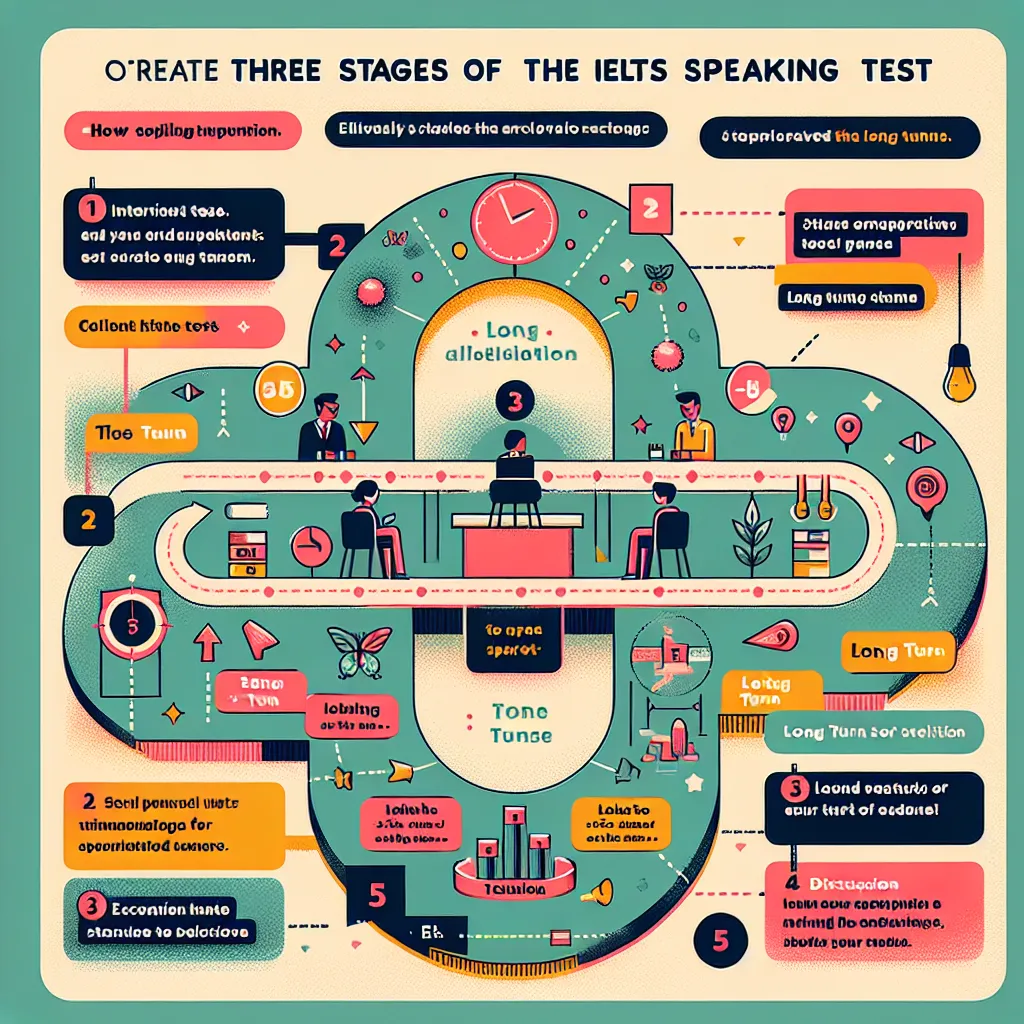Are you preparing for the IELTS Speaking test and wondering what lies ahead? As an experienced IELTS instructor and content creator at LearnEnglish.NET, I’m here to provide you with a detailed overview of what you can expect during this crucial part of your IELTS journey. Whether you’re a beginner or looking to enhance your skills, this guide will help you navigate the Speaking test with confidence.
Understanding the IELTS Speaking Test Format
The IELTS Speaking test is designed to assess your ability to communicate effectively in English. It’s a face-to-face interview with an examiner, lasting between 11-14 minutes, and is divided into three parts. Let’s break down each part to give you a clear picture of what to expect.
 IELTS Speaking Test Format
IELTS Speaking Test Format
Part 1: Introduction and Interview (4-5 minutes)
In this initial phase, you can expect:
- A warm greeting from the examiner
- Questions about yourself and familiar topics such as:
- Your home/accommodation
- Your work or studies
- Your hobbies and interests
- Your family and friends
This part is designed to help you relax and get comfortable speaking English. The questions are straightforward, and you should aim to provide detailed responses without hesitation.
Part 2: Individual Long Turn (3-4 minutes)
This section, often called the “cue card” or “topic card” part, involves:
- Receiving a card with a topic and prompts
- 1 minute to prepare your response
- Speaking for 1-2 minutes on the given topic
- Answering one or two follow-up questions from the examiner
Topics can range from describing a person or place to talking about an experience or object. The key here is to organize your thoughts quickly and speak coherently for the full duration.
Part 3: Two-way Discussion (4-5 minutes)
The final part of the test involves:
- A discussion related to the topic from Part 2
- More abstract questions requiring deeper thought and analysis
- Opportunity to express opinions and discuss ideas
This section assesses your ability to engage in more complex conversations and express your views on various issues.
What Examiners are Looking For
Understanding the assessment criteria can help you focus on key areas during your preparation. Examiners evaluate your performance based on four main criteria:
- Fluency and Coherence
- Lexical Resource (Vocabulary)
- Grammatical Range and Accuracy
- Pronunciation
Fluency and Coherence
Examiners will assess your ability to:
- Speak at a natural pace without long pauses
- Use connective words and phrases to link your ideas
- Develop your responses with relevant information
Lexical Resource
Your vocabulary usage is crucial. Examiners look for:
- A wide range of vocabulary appropriate to the topics
- Accurate use of idiomatic expressions and collocations
- Ability to paraphrase when you can’t find the exact word
Grammatical Range and Accuracy
You’ll be evaluated on:
- The variety of grammatical structures you use
- The accuracy of your grammar, including complex sentences
- Your ability to self-correct minor errors
Pronunciation
Examiners will consider:
- Your ability to speak clearly and be easily understood
- Your use of stress, intonation, and rhythm
- Consistency in pronunciation throughout the test
Tips for Success in the IELTS Speaking Test
To perform well in the Speaking test, consider the following advice:
- Practice regularly with native speakers or language exchange partners
- Record yourself speaking and analyze your performance
- Expand your vocabulary by reading widely and learning new words in context
- Work on your pronunciation, paying attention to stress and intonation
- Develop strategies for buying time when you need to think (e.g., using filler phrases)
- Stay informed about current affairs to discuss a wide range of topics confidently
Common Challenges and How to Overcome Them
Many test-takers face similar challenges in the Speaking test. Here are some common issues and strategies to address them:
Nervousness
- Take deep breaths before and during the test
- Remember that the examiner is there to help, not to trick you
- Practice with mock tests to build confidence
Limited Vocabulary
- Learn synonyms and antonyms for common words
- Study topic-specific vocabulary lists
- Use new words in context regularly
Difficulty in Extending Answers
- Practice the STAR method (Situation, Task, Action, Result) for structuring responses
- Prepare examples and anecdotes for common topics
- Learn to elaborate on your opinions with reasons and examples
Pronunciation Issues
- Focus on problematic sounds specific to your language background
- Use pronunciation apps and online resources for targeted practice
- Listen to and imitate native speakers’ intonation and stress patterns
Next Steps in Your IELTS Preparation
Now that you know what to expect in the IELTS Speaking test, it’s time to take action:
- Create a study schedule focusing on each part of the Speaking test
- Find a study partner or join an IELTS preparation group for regular speaking practice
- Take mock tests under timed conditions to simulate the real test environment
- Review official IELTS Speaking test samples to understand the expected level
- Consider enrolling in an IELTS preparation course for expert guidance and feedback
Remember, successful preparation for the IELTS Speaking test is about consistent practice and strategic improvement. By understanding the test format, focusing on the assessment criteria, and addressing common challenges, you’ll be well-equipped to perform your best on test day.
Are you feeling more confident about What To Expect In The IELTS Speaking Test? Share your thoughts and questions in the comments below, and don’t forget to check out our other IELTS preparation resources to boost your overall performance!
[internal_links]




